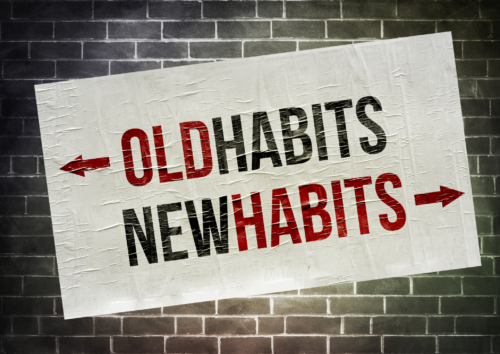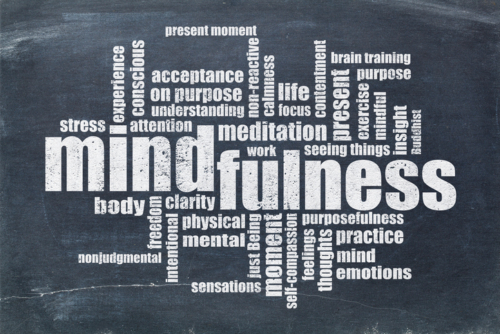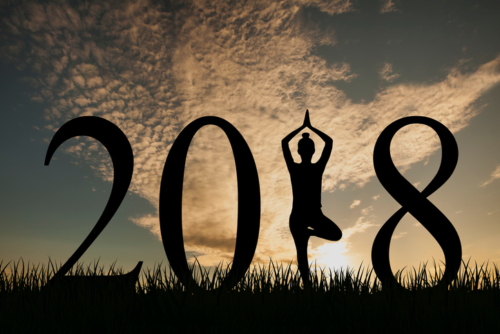Article by Carole Frost B.Sc (Hon’s)
With Christmas on the horizon we often begin to reflect on another year almost over and perhaps even give thought to the year that lies ahead. For many people it’s a customary time for new beginnings and new resolves. Many people fall into two categories. The ones who have given up making new year resolutions, and the ones who indulge the new year with fresh wishes, and wants and embrace the season as a time to create change. So my question is not ‘Why do so many New Year resolutions fail (my answer is simple, people just don’t try hard enough – read on for the answer), but rather ’Why do we not use Yoga to help us?’. Helping us make and keep new habits is right up the proverbial path of Yoga – it’s almost what it was made for!!
Some research was published at the University of Southern California (USC) suggesting that failing to change habits was not necessarily due to lack of willpower, and that it was easier to create habits than stop old ones. In part this is true because it takes longer to break an old habit that it does to create a new one.
At first it seems this study gets us off the hook and provides a convenient excuse as to why we fail sometimes, that somehow it’s not our fault – however it’s not that simple, in fact quite the contrary – I think it’s more that we are not fighting fire with fire!

Habit comes from the sub-conscious mind, so a desire to change it or create a new one must attack from the same level. Trying to put the conscious mind in charge over something that is sub-conscious is bound to failure. In short it means you eat the metaphorical fattening sugar laced cake, and don’t realise it was a bad thing to do untilafter the event. What you want is an intervention before you tucked in! Yoga was precisely designed to examine this inner-world, the place of our subconscious, and hence tackle the problem of ‘failure to change’ at source.
A habit is a precisely that, a habit because it’s something we do without conscious thought, it’s automatic. The study at USC looked to prove this by showing that students that were under high exam stress continued with habits both good and bad no matter the degree of stress, in fact habitual patterns grew stronger at times of increased stress.
Habits can come from the product of our environment e.g. walking past the bakery and indulging, or they can come from our inner worlds, our habitual thought patterns and reasoning based on our experiences. More often than not both of these affect what habits we develop through our lives such as eating when we are grumpy, similarly good habits form like going for a run we know we are stressed. This is complex enough before we even consider the complex process of actually being ‘addicted’ to something.
Without getting too deep, yoga is the perfect fit for the job. Yoga was developed for us learn how to control our thoughts for the greater good of feeling inner calm and knowing ourselves. Without getting too deep this aspect of knowing ourselves or ‘self-study’ is called svadyahya – the ability to study yourself and understand how you work and what brings you to make choices.
The mind is also subject to Ego (according to yoga one of the 5 root causes of unhappiness in life), and Ego drives us often to be concerned with what we want rather than what we truly need in life. You want the cake, but you don’t need it. You may be hungry and even truly know deep down you deserve something better to eat, however the Ego says….but I want it because the senses will love it..yum! The ego and senses over ride the better reasoning of our SELF. How do we stop this cycle? Answer: YOGA
Yoga puts us back in touch with our SELF, and helps us to silence the ego and not be slave to the senses. What’s more, Yoga makes it easy because good yoga asana (poses or physical practice) and meditation practices encourage the ego to slip away because it no longer serves what is right for us. Yoga practice guides us to listen to what we really need. i.e. give me breakfast not cake! Yoga creates an inner world or environment that enables the voice of the SELF to be heard, and cultivates discipline to manifest new habits that serve us well. We can’t change everything about the outside world, we may not be able to choose a different path so we don’t pass the bakery, but what we are fully able to do is make good choices and be responsible for ourselves – one of the primary teachings of Yoga.
When making change and making new habits, start small, prove to yourself that YOU are really in charge, not your ego or senses. Can you for one day try not to eat processed food? Why not find a good Yoga class and discover how you can shift your state of awareness through this ancient practice. Yoga puts us back in touch with our intuition, awareness and person power. Who wouldn’t want that?
If you are interested in becoming a Yoga teacher, enrol on our Level 3 Diploma in Teaching Hatha Yoga and empower your change for 2018.


